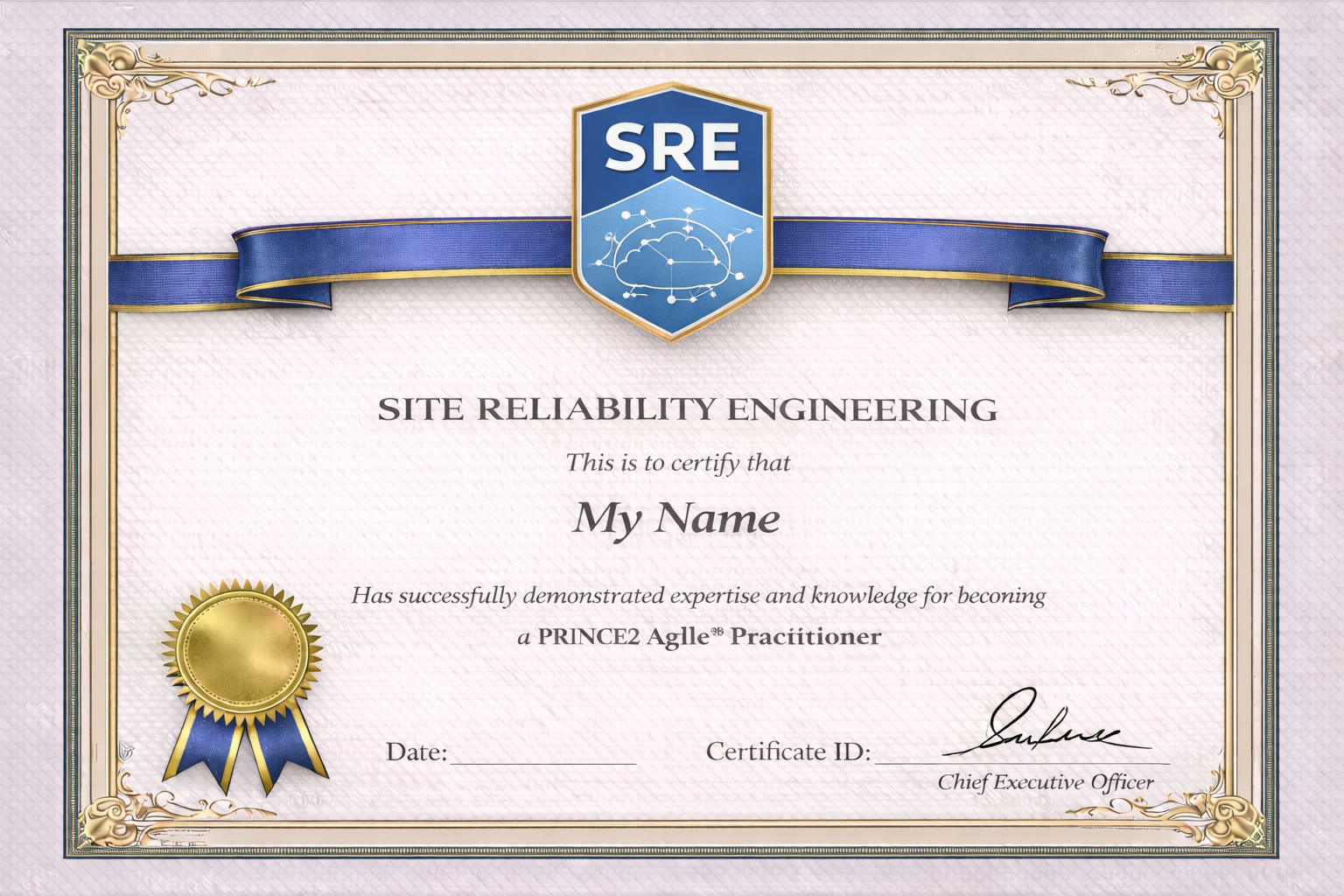Site Reliability Engineering (SRE) Course Overview
Site Reliability Engineering (SRE) is a discipline that incorporates aspects of software engineering and applies them to infrastructure and operations problems. The SRE Certification Training equips professionals with the skills and knowledge to design, deploy, and maintain scalable and highly reliable systems. It focuses on the implementation of best practices for improving system reliability, performance, and scalability.
The training program covers key SRE principles such as automation, monitoring, incident management, capacity planning, and change management, which are crucial for maintaining the availability and reliability of services in a fast-paced and complex IT environment.
High Demand for SRE Professionals: As more organizations adopt cloud technologies, microservices, and DevOps practices, there’s a growing demand for SRE professionals who can ensure the reliability, scalability, and performance of complex systems.
Skillset Expansion: This certification will give you the opportunity to expand your technical skills in areas such as automation, system monitoring, performance tuning, and incident response.
Bridge Between Development and Operations: SRE helps bridge the gap between software engineering and operations, enabling you to work more effectively in DevOps environments.
Increased Career Opportunities: As organizations prioritize system reliability, SRE roles are becoming crucial to their IT infrastructure. The certification will open doors to advanced positions such as Site Reliability Engineer, DevOps Engineer, and Cloud Infrastructure Engineer.
The job market for Site Reliability Engineers is rapidly growing. Organizations, especially those that operate in the cloud or manage large-scale distributed systems, need professionals who can ensure the reliability and efficiency of their infrastructure.
Roles available to SRE certified professionals include:
Site Reliability Engineer
DevOps Engineer
Cloud Infrastructure Engineer
System Reliability Manager
Automation Engineer
Infrastructure Engineer
Performance Engineer
Operations Engineer
The scope of SRE is broad, covering a variety of industries including tech companies, e-commerce platforms, financial institutions, healthcare providers, and more. The adoption of cloud computing, microservices architecture, and containerization is expected to fuel the demand for SRE professionals.
Why should I get Site Reliability Engineering (SRE) Certification Training

Site Reliability Engineering (SRE) Certification Training is a specialized course designed to teach you the principles and practices of SRE, which focuses on improving system reliability, scalability, and performance. The training covers key areas such as automation, monitoring, incident management, capacity planning, and optimizing system availability. The certification validates your expertise in applying SRE practices in real-world environments to ensure efficient IT operations and high-quality service delivery.
The SRE Certification Training is perfect for:
IT professionals such as DevOps Engineers, System Administrators, and Operations Engineers who want to expand their expertise into Site Reliability Engineering.
Software Engineers interested in improving application reliability and performance.
Cloud Engineers and Infrastructure Engineers who wish to adopt SRE principles for managing scalable systems.
Managers and team leads in charge of optimizing system operations and ensuring the availability of services at scale.
The SRE Certification Training covers the following key topics:
| Introduction to SRE: Understanding the origins, principles, and goals of Site Reliability Engineering. |
| SRE vs. DevOps: Differences between SRE and DevOps, and how they complement each other. |
| Service Level Objectives (SLOs), Service Level Indicators (SLIs), and Service Level Agreements (SLAs): Defining and measuring the reliability of services. |
| Error Budgets: Using error budgets to balance the tradeoff between speed and reliability. |
| Incident Management: Best practices for managing incidents, minimizing downtime, and improving system resilience. |
| Automation: Implementing automation for repetitive tasks, such as provisioning, monitoring, and scaling. |
| Capacity Planning: Planning for future growth by predicting system demand and scaling infrastructure accordingly. |
| Monitoring and Observability: Setting up effective monitoring systems and maintaining observability to detect and respond to issues quickly. |
| Change Management and Reliability: Ensuring changes are introduced without negatively impacting system reliability. |
| Postmortem Analysis: Conducting post-incident reviews to learn from failures and improve system reliability. |
There are no formal prerequisites for the SRE Certification Training. However, having a basic understanding of software development, system administration, and cloud technologies will be beneficial. Previous experience with IT operations, monitoring, and automation will help you grasp the concepts of SRE more quickly.
The SRE Certification Training typically takes 3-4 days for live, instructor-led sessions. The training is available in the following formats:
Live Online Training: Participate in real-time sessions with expert instructors.
In-person Classroom Training: Available at authorized training centers.
Self-paced Online Training: Learn at your own pace through pre-recorded lessons and exercises.
The SRE certification exam is typically an online, multiple-choice exam designed to assess your understanding of key Site Reliability Engineering concepts. The exam includes questions related to SLOs, incident management, monitoring, and automation. The exam duration is 60 minutes, and you will need to score 70% or above to pass.
The SRE Certification enhances your career by providing you with the skills to ensure the reliability, scalability, and performance of large-scale systems. As SREs are in high demand to improve uptime, minimize outages, and optimize operational efficiency, certified professionals can pursue roles such as:
Site Reliability Engineer (SRE)
Infrastructure Engineer
Cloud Engineer
DevOps Engineer
Systems Engineer
After completing the Site Reliability Engineering Certification Training, you can register for the SRE exam via the course provider's website. The exam can be taken online, giving you the flexibility to complete it at your convenience.
he passing score for the SRE certification exam is typically 70%. The exam is designed to test your understanding of SRE principles, practices, and tools essential for maintaining and optimizing the reliability of modern systems.
Yes, if you do not pass the SRE certification exam, you can retake it. The exam provider typically allows you to retake the exam after a waiting period, and there may be an additional fee for each attempt.
Yes, after successfully passing the Site Reliability Engineering exam, you will receive the official SRE Certification. This certificate validates your expertise in SRE practices and enhances your professional profile in IT and operations management.
The SRE Certification is generally valid for 3 years. After this period, you may need to complete additional training or recertification to maintain your credentials and stay up-to-date with evolving SRE practices and tools.



